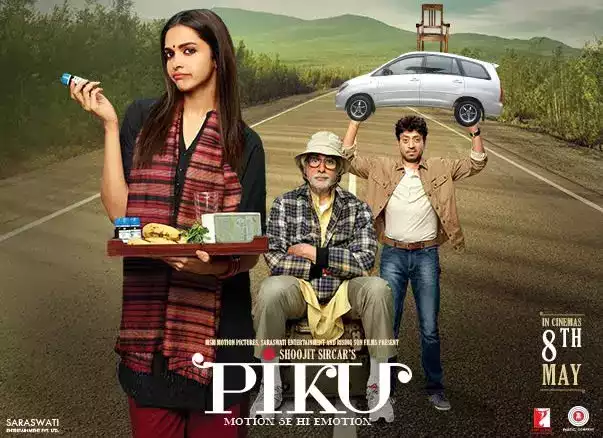“Piku” is a heartwarming comedy-drama that gracefully captures the nuances of family dynamics, love, and the complexities of life. Directed by Shoojit Sircar and released in 2015, this Indian film resonated deeply with audiences for its relatable characters, witty dialogue, and poignant storytelling. In this comprehensive review, we delve into the intricacies of “Piku,” exploring its narrative, performances, themes, and overall impact on viewers.
Plot Summary:
“Piku” revolves around the eccentric Piku Banerjee, a fiercely independent woman in her thirties who juggles her career, family responsibilities, and the care of her aging father, Bhaskor. The film unfolds against the backdrop of a road trip from Delhi to Kolkata, as Piku, her hypochondriac father, and their loyal caretaker, Rana, embark on a journey filled with laughter, love, and unexpected revelations. As they navigate the highs and lows of family life, Piku grapples with her own desires for independence and romance, while Bhaskor confronts his mortality and the complexities of father-daughter relationships.
Themes:
“Piku” explores several themes that resonate deeply with audiences:
- Family Bonds: At its core, the film celebrates the complexities and nuances of family relationships. Through the Banerjee family’s interactions, “Piku” highlights the bonds of love, duty, and sacrifice that unite them, while also delving into the challenges and conflicts that arise from their differing personalities and perspectives.
- Caretaking and Aging: The film addresses the theme of caretaking and aging with sensitivity and humor. Bhaskor’s eccentricities and health concerns serve as a catalyst for exploring the challenges and rewards of caring for aging parents, as Piku and Rana navigate their roles as caregivers with patience, compassion, and understanding.
- Identity and Independence: “Piku” explores themes of identity and independence through its titular character. Piku’s quest for personal and professional fulfillment reflects the aspirations and struggles of modern women in balancing career aspirations, familial obligations, and personal desires.
- Life’s Quirks and Ironies: The film revels in life’s quirks and ironies, finding humor and poignancy in the everyday moments and idiosyncrasies of its characters. From Bhaskor’s obsession with his bowel movements to Piku’s struggles with love and relationships, “Piku” offers a refreshing and relatable portrayal of the messiness and beauty of life.
Performances:
“Piku” features standout performances by its cast, bringing depth, humor, and authenticity to their characters:
- Deepika Padukone as Piku Banerjee: Deepika Padukone shines in the titular role, embodying Piku’s wit, resilience, and vulnerability with effortless charm. Her portrayal of the headstrong yet compassionate protagonist anchors the film, as she navigates the complexities of family, love, and self-discovery with grace and authenticity.
- Amitabh Bachchan as Bhaskor Banerjee: Amitabh Bachchan delivers a tour de force performance as Bhaskor, bringing the eccentric patriarch to life with humor, pathos, and humanity. His portrayal of the lovably cantankerous Bhaskor is both endearing and relatable, as he grapples with the challenges of aging and mortality with wit and wisdom.
- Irrfan Khan as Rana Chaudhary: Irrfan Khan charms audiences with his portrayal of Rana, the affable cab driver who becomes entangled in the Banerjee family’s drama. Khan infuses Rana with warmth, humor, and vulnerability, creating a nuanced and empathetic character who serves as a grounding presence amidst the chaos of Piku’s world.
Directorial Vision:
Director Shoojit Sircar’s vision shines through in every frame of “Piku,” as he skillfully balances humor, emotion, and social commentary with finesse. Sircar’s intimate and understated approach to storytelling allows the film’s characters and themes to resonate deeply with audiences, while his meticulous attention to detail and pacing ensures a seamless and engaging viewing experience. Through his nuanced direction, Sircar captures the essence of everyday life with honesty, humor, and heart, creating a film that is as entertaining as it is thought-provoking.
Cinematography and Music:
“Piku” boasts beautiful cinematography by Kamaljeet Negi, capturing the vibrant streets of Delhi and Kolkata with warmth and authenticity. The film’s visuals evoke a sense of nostalgia and familiarity, transporting viewers into the heart of urban India. Anupam Roy’s soulful music and lyrics complement the film’s narrative perfectly, enhancing the emotional depth and resonance of key moments.
Critical Reception and Legacy:
“Piku” received widespread critical acclaim upon its release, with praise for its engaging storyline, authentic performances, and relatable characters. The film struck a chord with audiences of all ages, earning commercial success and numerous awards and nominations. Its enduring legacy continues to resonate with viewers, as “Piku” remains a beloved favorite in Indian cinema, celebrated for its humor, heart, and humanity.
Conclusion:
In conclusion, “Piku” is a delightful and heartwarming film that celebrates the quirks and complexities of family life with humor, warmth, and humanity. Through its engaging narrative, relatable characters, and poignant themes, “Piku” offers a refreshing and insightful portrayal of modern relationships and the intricacies of love, duty, and identity. Director Shoojit Sircar’s sensitive direction, coupled with stellar performances by Deepika Padukone, Amitabh Bachchan, and Irrfan Khan, elevates “Piku” to a timeless classic that continues to charm and resonate with audiences worldwide.
